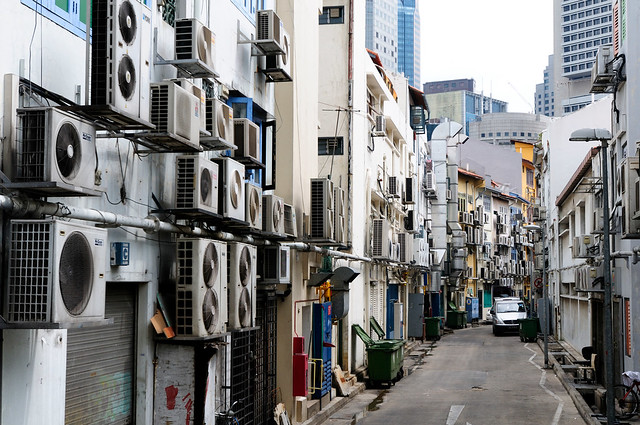http://e-info.org.tw/node/117848
吹冷氣也救北極熊 國際呼籲淘汰HFCs冷媒
文字大小
60 1 Share1
本報2016年8月19日綜合外電報導,蔡宜臻編譯;蔡麗伶審校
不開冷氣,幾乎抵擋不住異常燠熱的夏季;但看著北極熊瘦成皮包骨的影片,你是否每次開冷氣都有內疚感?開冷氣是否就直接造成全球暖化呢?
開發中國家的冷氣使用率預估在未來十年內大幅上升。圖片來源:Peter Morgan(CC BY-NC-ND 2.0)。
冰箱、冷氣常見冷媒 HFCs暖化威力強過二氧化碳
科學家上月發現,地球的臭氧層破洞開始縮小,並將這個結果歸功於1987年生效的《蒙特婁公約》,當時全球將近200個國家同意禁用氟氯碳化物(CFCs),改用氫氟碳化物(HFCs),成功修復了臭氧層破洞,卻沒想到,HFCs的暖化威力,比二氧化碳高出數千倍之多。
針對這點,《蒙特婁公約》簽署國上月底對議定書進行修正,將規範HFCs以及氫氟烴類的使用,包括冰箱以及冷氣的保冷功能。這也昭告了接下來的幾年,冷氣機的運作模式將有所不同。
不過現階段不須過度緊張,《紐約時報》報導,冷氣機正常運作下,並不會釋放HFCs。但如果冷氣或冰箱有漏氣的現象,或是沒有妥善丟棄冷氣機,就有可能洩漏出HFCs,製造過程也會釋放出HFCs。
美國正在設立相關法規,逐步淘汰HFCs的應用,像是噴霧劑以及發泡劑。
減緩暖化 國際籲禁用HFCs
為了盡速淘汰HFCs的製造與使用,減緩暖化,美國訂出時程,已開發國家必須在2019年以前淘汰,開發中國家則要在2021年前完成。面對緊迫的期限,印度就提出反對意見,指出該國的冷氣使用率預計在未來幾十年內大幅上升,而這項規範將導致不公平的經濟負擔,希望期限能額外延長15年。
美國環保署對此指出,由於開發中國家仍廣泛使用氟氯烴,較好的方法是直接改用對環境友善的代替品,而不是等經濟發展完善後再轉變。
既然HFCs會傷害環境,要用什麼製冷呢?根據《立場新聞》,美國工程企業 Honeywell 投資了10億美元左右,研發氫氟烯烴(HFOs)取代HFCs ,該種冷凍劑的能源效益較高,而且在幾日內就可以被分解,不會長期殘留於大氣中吸熱,也不會破壞臭氧層,有望在不久的將來上市。

We may be in the clear when it comes to heat domes, but it’s still really hot. More than half of the country has had temperatures in the 90s in the last week, prompting many people to find relief in the cool, crisp breeze of an air-conditioner.
But in the next few years, the way air-conditioners work could change. Last month, representatives from nearly 200 countries worked on a new environment agreement to regulate the use of HFCs, or hydrofluorocarbons. These chemical compounds are responsible for keeping you cool on hot summer days, in air-conditioners and refrigerators. And even though you might not have heard of them, environmentalists, government officials and scientists say an agreement to limit HFCs represents a significant step in the fight to stave off the worst effects of global warming.
That’s because like other greenhouse gases, HFCs contribute to global warming. But mostly, they’re not coming from your air-conditioner, though air-conditioning poses other environmental problems. So we’re here to answer some questions you might have about HFCs, air-conditioning and this new treaty.
Is my air-conditioner causing global warming?
It’s complicated.
HFCs represent a small portion of total greenhouse gas emissions, but they trap thousands of times as much heat in the atmosphere as carbon dioxide.
Good news: If your air-conditioner is working properly, it won’t release HFCs into the atmosphere. Some HFCs are released during the manufacturing process, if your air-conditioner or refrigerator has a leak, or when you throw a unit away, possibly causing some molecules to escape, especially if it’s disposed of improperly (Here’s some guidance on proper disposal).
The United States has also put regulations in place to phase out the use of HFCs in other areas like aerosols and building foam.
So can I use my air-conditioner guilt free?
Not quite. Air-conditioning presents other problems: As of 2009, nearly 90 percent of American homes have air-conditioners, which account for about 6 percent of all the country’s residential energy use. All that air-conditioning releases about 100 million tons of carbon dioxide each year.
Short Answers to Hard Questions About Climate Change
The issue can be overwhelming. The science is complicated. We get it. This is your cheat sheet.

According to historians and others, the widespread availability of air-conditioning has allowed for more development in the hotter parts of the country — the South and the Southwest — where air-conditioning use is the highest in the country.
And once developers could rely on heating and cooling technologies, they often built less energy-efficient homes, which means that you have to use more air-conditioning or heating to get to the temperature you want.
What’s being done about HFCs?
Representatives from the same countries who negotiated the Paris agreement met in Vienna to discuss a plan for phasing out HFCs.
Any deal reached in these talks would be an amendment to the Montreal Protocol, which phased out CFCs (chlorofluorocarbons) only a few years after scientists published results showing the harm those chemicals were doing to the ozone layer.
The United States, which already has some regulations in place to limit HFCs, wants to begin phasing out production and use in 2019 in developed countries, and in 2021 in developing countries, though some developing countries, like India, would prefer a longer time-frame — beginning in 15 years. These restrictions, they say, would place an unfair economic burden on their citizens, especially as air-conditioning use is expected to skyrocket there in the next few decades.
However, the Environmental Protection Agency said that because another chemical compound, HCFCs (hydrochlorofluorocarbons), are still commonly used in the developing world, it would be better if they skipped ahead to the more environmentally-friendly replacements, rather than setting up a whole economy based on HFCs and then making the switch. HCFCs are not currently widely used in the United States and production and import here were largely halted last year.
But it’s so hot. Will I have to give up my air-conditioning?
No, although some experts say that there may be a time in the future when the climate in some places will be so hot that air-conditioning won’t be able to maintain comfortable temperatures.
And several companies are already working on cooling replacements for HFCs.
Sign Up for the Science Times Newsletter
Every week, we'll bring you stories that capture the wonders of the human body, nature and the cosmos.
For instance, Honeywell, which makes your dehumidifier but also plane engines, has already invested close to a billion dollars in developing and patenting an HFC substitute, which is already used by some manufacturers.
According to Ken Gayer, a vice president at Honeywell, these new molecules, known as HFOs (hydrofluoroolefins), break down in a matter of days, so there’s less time for them to trap heat in the atmosphere.
Will HFOs be as effective at cooling my home?
HFOs are as good at cooling your home and are more energy efficient, Mr. Gayer said, but they are more expensive and complicated to produce.
Honeywell started working on the HFOs in the 1990s, after scientists knew that HFCs were contributing to global warming, he said, adding that HFCs were always meant to be a transitional chemical, and not meant for long-term use.
Correction: August 10, 2016
An earlier version of this article misstated a type of appliance Honeywell makes. They make a variety of home appliances, they do not make dishwashers.


沒有留言:
張貼留言